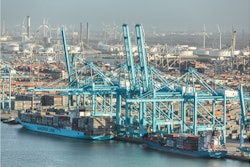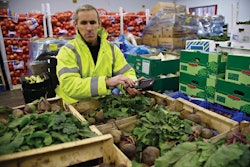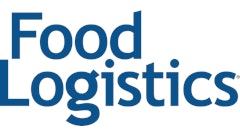The US Customs & Border Protection is the unified border agency within the Department of Homeland Security charged with the management, control and protection of US borders at and between the official ports of entry. CBP is charged with keeping terrorists and terrorist weapons out of the country while enforcing hundreds of US laws. It is also tasked with ensuring the safety of food, including fresh produce, entering the United States.
The agency has faced numerous and major transitions since the terrorist attacks of Sept. 11, 2001, and brokers who hold the responsibility of clearing fresh produce through the CBP agency and getting it on the road safely and expediently are fully cognizant of the amount of work and pressure that CBP officers currently face.
"One of the more challenging issues today is the congestion of fresh produce that is occurring in the Northeast," said Nelly Yunta, vice president of US imports, customs brokerage and consulting for Customized Brokers in Miami, FL. "Government agencies need more resources. When we need information or advice, we have to e-mail the agency and wait for a response because they are so busy that they cannot take phone calls. The CBP officers are doing as much as they possibly can today, but we need to do what we can to make the government aware that they need additional help so they can function at peak efficiencies."
Produce professionals are keenly aware of the problems that can arise when a container of fresh fruit or vegetables is held up at a port due to any number of reasons. The success of fresh produce is that it must arrive at its end user in good condition. Ms. Yunta said that she sometimes hears both importers and exporters say that it's not worth the risk to try to bring fresh produce into the US any longer.
"We are in the process of forming an association in south Florida, which is not yet named, to try to change US Department of Agriculture regulations to allow required produce that is cold treated to arrive in Florida," she said. "As of today, the regulation states that imported fresh produce is permitted entry into the US north of latitude 39. The reasoning behind this regulation is that the colder the climate at the port of entry, the less chance insects have of surviving."
Ironically, the regulation stays the same in the dead of summer, when temperatures in Philadelphia or Wilmington, DE, reach as high as or higher than in Miami.
There are reasons why cold treatment, typically done on ships during ocean transport, can fail, such as equipment failure or not maintaining the right temperature in a container. Northern cold-treatment facilities were built at least partially upon this theory; if the cold treatment fails on route, it can be done in a nearby warehouse.
"We don't have cold-treatment facilities in Florida because cargo is not permitted to come into our ports," said Ms. Yunta. "But if we had facilities here that were willing to do the treatment, it would help to ease the congestion that northern ports are dealing with today."
She noted that imported fruit and vegetable volumes increase every year, and along with it the congestion gets worse at northern ports every year.
"If our new group could emphasize the need for permission to bring fresh produce into Florida, and put it in an official way and present it in request proposal form to the USDA, and if the regulation were changed, it could relieve some of the congestion in the Northeast," she said. "With the import industry growing continually, this is an important need today."
Ms. Yunta stressed that the long clearance time at northern ports is not the fault of CBP officers -- they just need more help.
In September, CBP announced a pilot program that releases inspected cargo in real-time via smartphone technology. Enforcement Link to Mobile Operations – Cargo, being referred to as ELMOcargo, accesses cargo targeting data and permits field personnel to release the cargo in real-time at the conclusion of the inspection. ELMOcargo significantly decreases the time an importer has to wait for cargo that has been cleared.
ELMOcargo is being piloted at Port Everglades, FL, which is the 12th busiest sea container port in the United States.
"If ELMO were put into place in northern ports it would also help," said Ms. Yunta. "But as it's only in a pilot stage it's hard to say how long it will take for it to be implemented at all ports across the country, and the congestion needs to be alleviated soon.
"We don't want to take business away from Philadelphia or any other port, we just want to help capture the growth," she continued. "For us, it doesn't matter where the cargo arrives because we clear at all ports in the country."
But it does make a difference when the quality and condition, and hence price, of fresh produce is at risk because it cannot be cleared expediently.
Ms. Yunta said that the entire produce industry needs to pull together to help create a better flow of product from offshore.
"The options are more inspectors, more electronic devices and opening up Florida with cold-treatment approval," she said.
Source: The Produce News



















